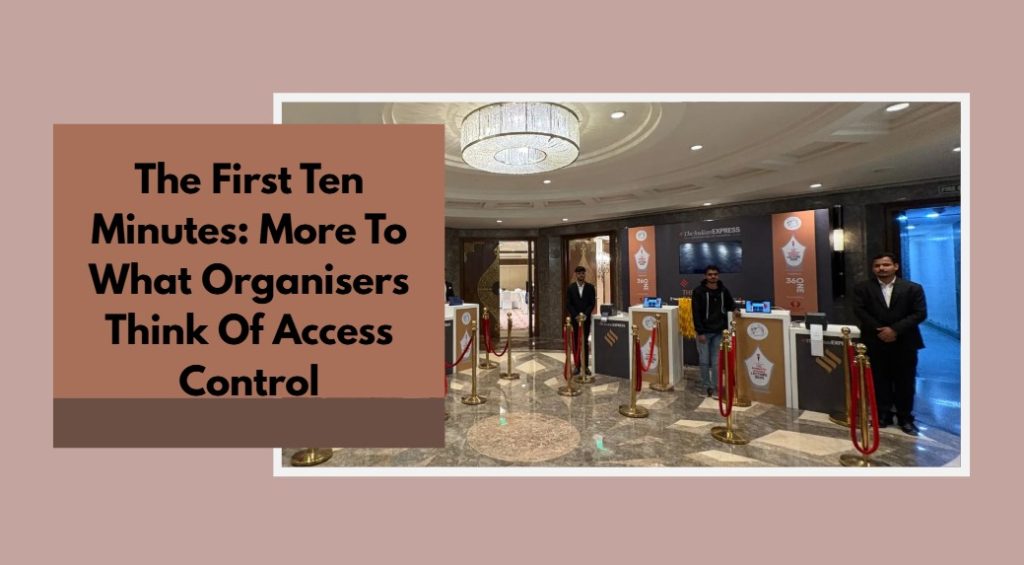In today’s data-led event landscape, understanding GDPR isn’t optional—it’s critical. Whether you’re hosting a festival in Mumbai, a trade show in Dubai, or a virtual seminar attracting EU attendees, GDPR applies the moment you collect personal data. It doesn’t matter where your event is hosted—what matters is who your attendees are.
If even one EU or EEA citizen registers, GDPR regulations kick in. This catches many organizers off guard, especially when planning events like hybrid expos or community-driven festivals. Here’s how many event teams overlook basic data security protocols—and how to fix it.
What kind of data does GDPR cover?
GDPR applies to any detail that can identify an attendee, whether directly (like a name or email) or indirectly (like session check-ins or photo uploads). At events, this could mean ticketing data, wallet transactions, access logs, lead scans, or dietary information. It applies to both virtual forms and in-person check-ins—essentially, anywhere data is captured.
At Saras Mela, for example, TicketRoot deployed a QR-based wristband wallet system for over 80,000 attendees. Not only did this reduce physical contact and line build-up, it also ensured that sensitive data was securely processed, encrypted, and auto-deleted within 30 days—aligning with GDPR’s “data minimization” principle. Explore how cashless systems support GDPR compliance.
Why legal basis matters for every data point
Before you ask for personal information—name, phone number, or even food preferences—you need to justify why you’re asking for it. This justification must fall under a legal basis outlined by GDPR: consent, contract, legal obligation, or legitimate interest.
Event Tech platforms help support these workflows through customizable forms and registration logic. For example, if you’re collecting medical info for access to wellness zones or special meals, the form must explain the purpose and capture consent.
Wondering how to phrase consent language in forms? See examples here
Getting consent right
GDPR insists on informed, explicit consent. That means no pre-checked boxes, no hidden opt-ins. Organizers must offer clear, standalone consent prompts for each data use—marketing, lead sharing, or third-party offers.
Consent must also be logged. At ICAI’s 36th Annual International Seminar in Abu Dhabi, RSVP confirmations and badge scans were timestamped and matched to individual access logs—creating a reliable audit trail without disrupting flow at entry points. This kind of logging is especially useful for handling post-event data access or deletion requests.
Not sure if WhatsApp-based registration supports GDPR-compliant consent logging? Explore RSVP and invite tools →
Storing only what you need—and for how long
A key GDPR principle is “data minimization”—only collect what you need, and don’t keep it longer than necessary. Many event platforms now support structured data lifecycles: ticketing records are typically stored actively for a short period post-event, then shifted to passive archives before eventual deletion. Wallet or payment data is often wiped after a set window—commonly 30 days—unless otherwise specified by the organizer.
How long can attendee data be stored in a UAE-based music festival? Read our Data Processing Agreement
Transparency = Trust
Attendees should always know what data you’re collecting, why you’re collecting it, who has access, and how they can change or delete it. It’s good practice—and a GDPR requirement—to publish this information clearly and accessibly, typically within your event’s privacy policy.
Need to publish a clear privacy policy for your next event? See an example here.
Be ready for data access and deletion requests
Under GDPR, users can ask to access, correct, transfer, or delete their data—and you have 30 days to comply. This becomes much easier when your event platform includes built-in tools for handling such requests via the admin dashboard. At Clockwork Events’ Ms. World 2024, organizers fielded multiple VIP data requests—highlighting how access and deletion requests are now part of the event operations norm, especially at high-profile gatherings.
Here’s how to prepare for such scenarios by building deletion pathways directly into your event data systems.
You’re the Controller. Your tech partners are Processors.
As an organizer, you’re the Data Controller—responsible for defining how and why data is collected. Your technology partners for ticketing, check-ins, or F&B payments act as Processors, handling data only as instructed by you. In large-scale events, particularly in the UAE, this responsibility overlaps with the obligations of local sponsors, who may also hold certain legal or contractual liabilities.
According to Creation Business Consultants, sponsors in the UAE have historically carried significant responsibilities, from managing compliance paperwork to assuming financial accountability on behalf of foreign entities. While regulations have evolved, this precedent means event organizers must align their GDPR responsibilities with local sponsorship agreements—ensuring that both contractual and data protection obligations are clearly defined before the event.
What does this mean for UAE-based events with sponsors?
It means your data responsibilities as Controller must be mirrored in sponsorship contracts, with clear clauses on data handling and liability. Read our GDPR & Compliance Statement.
What if there’s a data breach?
You’re required to notify GDPR authorities within 72 hours of becoming aware of any breach. That includes unauthorized access, leaks, or internal misuse. At the Fast Food & Café Convention (FFCC) in Riyadh, for example, strict access logging was crucial—every check-in, scan, and badge print was recorded with traceable identifiers. This type of audit trail not only streamlines event operations but also provides accountability if a data incident needs to be reviewed by regulators.
Final Thought: GDPR is a competitive advantage
In regions like the UAE and India—where digital transformation is moving fast—being GDPR-compliant isn’t just legal hygiene. It shows your attendees and sponsors that you take privacy seriously. That builds brand equity and future-proofs your event.
GDPR doesn’t have to be a blocker. It’s a blueprint for smarter, more intentional event operations.Not sure where to start? Connect with us to discuss your next event






